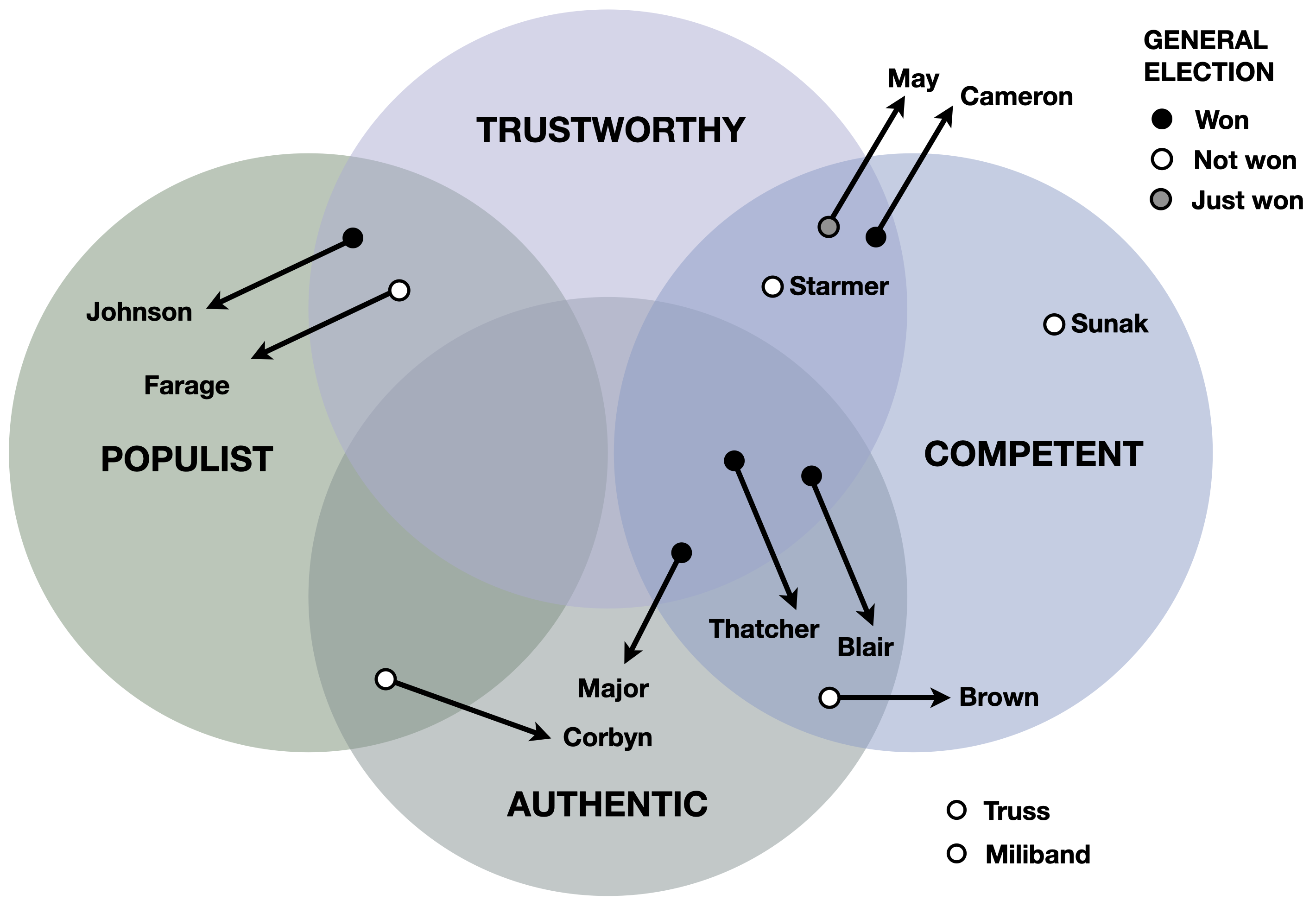Steve Richards in his last Rock'n'Roll Politics podcast of 2022 (the 27th November episode) relayed a lecture he'd given at Newcastle University on the theme of trust in UK politics. As always, his analysis was compelling, and he made the case that politicians are often forced to say and do things that damage trust for myriad complex reasons, including a hostile media landscape filled with journalists trying to catch them out, collective responsibility, impossible choices and a desire for cake-ism among the general public. (I think he quoted Roy Jenkins's observation that the UK wants European levels of public services and US levels of taxation).
Reflecting on Steve's themes made me think about the difference between trust in politicians and authenticity.
I think people are very suspicious (in general) of politicians they perceive to be inauthentic, even if they think they are trustworthy (and/or competent). You also have to consider competence, and if you overlay those things, I think you start to have a framework that gives some insight into recent UK Prime Ministers and Party Leaders.

Starting with Thatcher and Blair, when they were first elected they were surely perceived (by their supporters) as competent, trustworthy and authentic. Over their long periods in office, I think the thing they both mostly lost was trust, but both probably continued to be seen as fairly authentic and somewhat competent. Thatcher certainly lost trust over the Poll Tax, and Blair clearly lost it over the Iraq War. It could be argued that Blair also lost authenticity, particularly for those who believed he only did it to keep in with Bush in the US, but his own response to that was always along the lines of "it's even worse than you think: I believe in this war." I suspect a lot of people think that was the case, whatever they think of the wisdom or morality of that intervention.
When Major took over from Thatcher, he was also probably in the "good" intersection, seen as straightforwardly trustworthy, competent and authentic (again, primarily by his supporters). By the time he lost to Blair, he had lost both trust, primarily over sleaze, and perceived competence, primarily over the ERM exit.
Brown was probably never trusted as much as Blair, partly because of his habit of re-announcing the same money repeatedly, and partly because he did so much of his work as chancellor in stealth mode. But he was probably seen as both authentic and competent when he became PM. As bad as the financial crash was, I think his perceived competence might even have been enhanced by his handling of it, but with the higher scrutiny he received as PM, his relative discomfort in the spotlight combined with his getting cold feet about the election, his comments on Mrs Duffy and his "I agree with Nick" lines in the election debates to leave his perceived authenticity in tatters.
I'm not sure anyone would ever really have called Cameron or May authentic (particularly not Cameron) but they both had some level of trust when they were elected, and lost it by the time they left office. Probably few people ever saw Truss or Miliband as trustworthy, authentic or competent (though Miliband was surely more plausible on all these dimensions than Truss).
Other than the current two leaders, that leaves Johnson, Corbyn and probably Farage as major figures in recent British politics. In order to explain them, you have to add a Populist classification, which they all, in different ways, fit. Corbyn was always seen as authentic by his supporters, and even at the end I suspect never really lost that, but clearly became a rather unpopular populist.
It's hard for me to understand how anyone could ever have thought Johnson or Farage were in any way trustworthy, but their levels of popular support must indicate that a significant number of people trusted them at least in a transactional kind of a way to "get Brexit done". But surely there can't be more than handful of people in the whole country who could consider either of them in any way authentic.
The other thing this exercise highlighted for me, however, that I think it’s an interesting way to think about Starmer (and to a lesser extent, Sunak). I think Starmer must score well on trustworthiness at the moment, and probably mostly on competence too. I suspect his problem is that he’s perceived as not very authentic, and I think this could still prove a huge obstacle for him at the next election and highlights the danger of his current positioning. We all know he’s much more pro-European than he is currently willing to admit, and this inauthenticity could prove a huge stumbling block under sustained attack at the election. He risks losing support both from those who think Brexit was a catastrophe and those who support it but would struggle to trust someone inauthentically claiming he doesn’t see it as a problem.